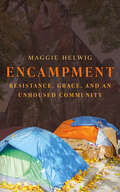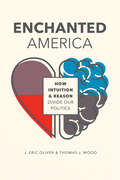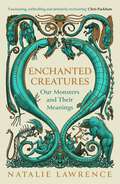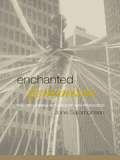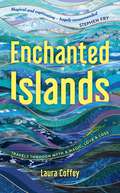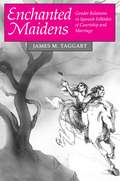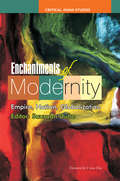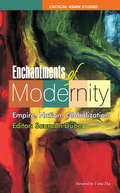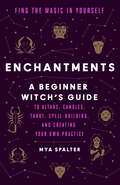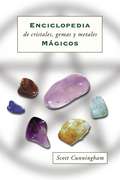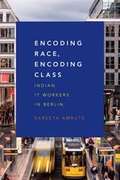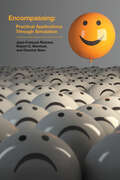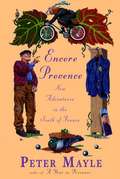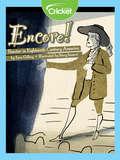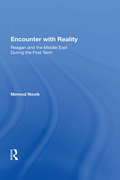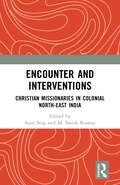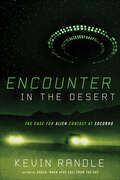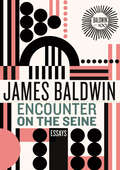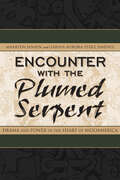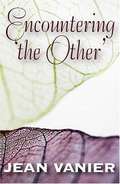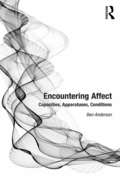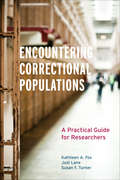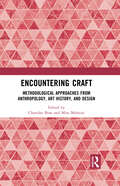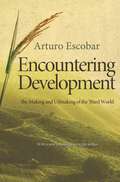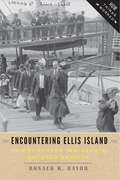- Table View
- List View
Encampment: Resistance, Grace, and an Unhoused Community
by Maggie Helwig"Striking, elegant." – Publishers Weekly, ★ STARRED Review"An activist priest provides sanctuary for an encampment of unhoused people in her churchyardThe housing crisis plaguing major urban centres has sent countless people into the streets. In spring 2022, some of them found their way to the yard beside the Anglican church in Toronto’s Kensington Market, where Maggie Helwig is the priest. They pitched tents, formed an encampment, and settled in. Known as an outspoken social justice activist, Helwig has spent the last three years getting to know the residents and fighting tooth and nail to allow them to stay, battling various authorities that want to clear the yard and keep the results of the housing crisis out of sight and out of mind. Encampment tells the story of Helwig’s life-long activism as preparation for her fight to keep her churchyard open to people needing a home. More importantly, it introduces us to the Artist, to Jeff, and to Robin: their lives, their challenges, their humanity. It confronts our society’s callousness in allowing so many to go unhoused and demands, by bringing their stories to the fore, that we begin to respond with compassion and grace.
Enchanted America: How Intuition and Reason Divide Our Politics
by J. Eric Oliver Thomas J. WoodAmerica is in civic chaos, its politics rife with conspiracy theories and false information. Nationalism and authoritarianism are on the rise, while scientists, universities, and news organizations are viewed with increasing mistrust. Its citizens reject scientific evidence on climate change and vaccinations while embracing myths of impending apocalypse. And then there is Donald Trump, a presidential candidate who won the support of millions of conservative Christians despite having no moral or political convictions. What is going on? The answer, according to J. Eric Oliver and Thomas J. Wood, can be found in the most important force shaping American politics today: human intuition. Much of what seems to be irrational in American politics arises from the growing divide in how its citizens make sense of the world. On one side are rationalists. They use science and reason to understand reality. On the other side are intuitionists. They rely on gut feelings and instincts as their guide to the world. Intuitionists believe in ghosts and End Times prophecies. They embrace conspiracy theories, disbelieve experts, and distrust the media. They are stridently nationalistic and deeply authoritarian in their outlook. And they are the most enthusiastic supporters of Donald Trump. The primary reason why Trump captured the presidency was that he spoke about politics in a way that resonated with how Intuitionists perceive the world. The Intuitionist divide has also become a threat to the American way of life. A generation ago, intuitionists were dispersed across the political spectrum, when most Americans believed in both God and science. Today, intuitionism is ideologically tilted toward the political right. Modern conservatism has become an Intuitionist movement, defined by conspiracy theories, strident nationalism, and hostility to basic civic norms. Enchanted America is a clarion call to rationalists of all political persuasions to reach beyond the minority and speak to intuitionists in a way they understand. The values and principles that define American democracy are at stake.
Enchanted Creatures: Our Monsters and Their Meanings
by Natalie LawrenceThe hydra rears its many heads in a flurry of teeth and poisonous fumes. The cyborg lays waste to humanity with a ruthless, expressionless stare.From ancient mythology to modern science fiction, we have had to confront the monsters that lurk in the depths of our collective imagination. They embody our anxieties and our irrational terrors, giving form to what we don't wish to know or understand. For millennia, monsters have helped us to manage the extraordinary complexity of our minds and to deal with the challenges of being human.In Enchanted Creatures, Natalie Lawrence delves into 15,000 years of imaginary beasts and uncovers the other-worldly natural history that has evolved with our deepest fears and fascinations. Join Lawrence on a tour of prehistoric cave monsters, serpentine hybrids, deep-sea leviathans and fire-breathing Kaiju. Discover how this monstrous menagerie has shaped our minds, our societies and how we see our place in nature.
Enchanted Feminism: The Reclaiming Witches of San Francisco (Religion and Gender)
by Jone SalomonsenThis is the first major study of the most famous Reclaiming Witch community, founded in 1979 in San Francisco, written by an author who herself participated in a coven for ten years. Jone Salomonsen describes and examines the communal and ritual practices of Reclaiming, asking how these promote personal growth and cultural-religious change.
Enchanted Islands: A Mediterranean Odyssey – A Memoir of Travels through Love, Grief and Mythology
by Laura CoffeyEnchanted Islands tells the true story of Laura Coffey's epic journey around the mystical archipelagos of the Mediterranean. Blending memoir, travel and nature writing with tales from The Odyssey, and infused with sharply comic wit, this is a celebration of the redemptive powers of cold-water swimming and luminous star-lit skies.
Enchanted Maidens: Gender Relations in Spanish Folktales of Courtship and Marriage
by James M. TaggartSpanish villagers tell many folktales that describe in metaphorical language the struggles of young men and women as they emerge from their parental families and join in love. In this book James Taggart presents dozens of orally transmitted tales, including "Snow White," "Cinderella," "Beauty and the Beast," "Blancaflor," and dragonslayer stories, collected from seven villages in the region of CNBceres, and analyzes the differences in male and female approaches to telling them. His study shows how men and women use the tales to grapple with some of the contradictions found in gender relations in their culture, which conditions men to be sexually assertive and to marry virgins and which teaches women to fear the men who court them. Taggart interprets the male-female dialogue voiced through storytelling by linking the content of specific tales to the life experiences and gender of the storyteller. Men and women, he finds, carry out an exchange of ideas by retelling the same stories and altering the plots and characters to express their respective views of courtship. This indirect narrative dialogue conveys an understanding of the opposite sex and establishes a common model of marriage that permits men and women to overcome their fear of each other and bond in heterosexual love.
Enchantments of Modernity: Empire, Nation, Globalization (Critical Asian Studies)
by Saurabh DubeThe notion of modernity hinges on a break with the past, such as superstitions, medieval worlds, and hierarchical traditions. It follows that modernity suggests the disenchantment of the world, yet the processes of modernity also create their own enchantments in the mapping and making of the modern world. Straddling a range of disciplines and perspectives, the essays in this edited volume eschew programmatic solutions, focusing instead in new ways on subjects of slavery and memory, global transformations and vernacular and vernacular modernity, imperial imperatives and nationalist knowledge, cosmopolitan politics and liberal democracy, and governmental effects and everyday affects. It is in these ways that the volume attempts to unravel the enchantments of modernity, in order to approach anew modernity's constitutive terms, formative limits, and particular possibilities.
Enchantments of Modernity: Empire, Nation, Globalization (Critical Asian Studies)
by Saurabh DubeThe notion of modernity hinges on a break with the past, such as superstitions, medieval worlds, and hierarchical traditions. It follows that modernity suggests the disenchantment of the world, yet the processes of modernity also create their own enchantments in the mapping and making of the modern world. Straddling a range of disciplines and perspectives, the essays in this edited volume eschew programmatic solutions, focusing instead in new ways on subjects of slavery and memory, global transformations and vernacular and vernacular modernity, imperial imperatives and nationalist knowledge, cosmopolitan politics and liberal democracy, and governmental effects and everyday affects. It is in these ways that the volume attempts to unravel the enchantments of modernity, in order to approach anew modernity's constitutive terms, formative limits, and particular possibilities.
Enchantments: A Modern Witch's Guide to Self-Possession
by Mya Spalter Caroline PaquitaA wise, witchy, and welcoming guide to living life magically Mya Spalter has spent years among candles, herbs, cats, and spells as an employee at New York City’s oldest occult shop, Enchantments. Since it would get crowded in there if all of you visited, this beautifully illustrated book will be your guide to its secrets and stories; in the process, Mya will introduce you to some mystical concepts you can use to build spells and rituals that resonate with your own personal style, including: • Create and maintain altars Even people who aren’t spiritually inclined seem to be able to get down with the beneficial function of an altar as a place to model beauty and balance in their lives. It’s aspirational. • Save your love magic for yourself Because casting a love spell on someone else is pushy and far too easy to mess up. • Clean your filthy apartment Fine, maybe you make your bed every day, but Mya’s talking about the kind of grime you can’t necessarily see. • Money magic for need, not greed Hint: It starts with tipping well; it doesn’t pay to be miserly when asking the universe for abundance. Mya reveals the power of colors (Louboutins wouldn’t have the same status if their soles were lavender), the keys to banishing unfriendly spirits (with cleansing rituals or even a dance party), and invaluable instructions in the timeless arts of astrology, tarot, and finding a parking spot downtown. Open up this book and enchant your own life!Advance praise for Enchantments“Hilariously conversational, deceptively deep, and phenomenally illustrated, Enchantments will blow your mind and make you laugh while imparting expert knowledge of witchcraft and why it’s so needed today.”—Natasha Lyonne, actress and producer“Imagine that your best friend, a supremely cool, funny, and irreverent person, is also a witch willing to educate and inspire you toward your own witchy practice with humor, sass, and intelligence. This book is magic—literally!”—Michelle Tea, author of Modern Tarot“Part memoir, part recipe book, and part poetry collection, Enchantments lets readers in on the great secret of all witchcraft—that being a witch is about being free to be yourself.”—Dorothea Lasky, author of Milk and co-creator of Astro Poets“We can all use more magic in our lives in these trying times, and Enchantments will help us get started.”—Kimya Dawson, singer/songwriter, The Moldy Peaches
Encoding Race, Encoding Class: Indian IT Workers in Berlin
by Sareeta AmruteIn Encoding Race, Encoding Class Sareeta Amrute explores the work and private lives of highly skilled Indian IT coders in Berlin to reveal the oftobscured realities of the embodied, raced, and classed nature of cognitive labor. In addition to conducting fieldwork and interviews in IT offices as well as analyzing political cartoons, advertisements, and reports on white-collar work, Amrute spent time with a core of twenty programmers before, during, and after their shifts. She shows how they occupy a contradictory position, as they are racialized in Germany as temporary and migrant grunt workers, yet their middle-class aspirations reflect efforts to build a new, global, and economically dominant India. The ways they accept and resist the premises and conditions of their work offer new potentials for alternative visions of living and working in neoliberal economies. Demonstrating how these coders' cognitive labor realigns and reimagines race and class, Amrute conceptualizes personhood and migration within global capitalism in new ways.
Encompassing: Practical Applications Through Simulation
by Robert C. Marshall Jean-Francois Richard Chaohai ShenAn operational simulation-based implementation of a fundamental research principle in the sciences—the idea that a model must account for, or encompass, findings of alternative models.To account for the universal deficiency of all economic models, Jean-François Richard, Robert Marshall, and Chaohai Shen propose in this book an operational test of whether a model accounts for—or encompasses—key results of alternative models. This simulation-based approach is distinct from the likelihood-based approach of forty-plus years ago. It is specifically designed to be applicable to serious nonlinear applications, under the minimal requirement that the models under consideration be amenable to Monte Carlo simulations.The method of simulated moments, increasingly applied in major empirical applications, provides the ideal framework to compute a wide range of formal simulation-based encompassing test statistics. The authors argue that simulation-based encompassing is particularly easy to implement when the model of interest incorporates novel features relative to an earlier &“benchmark&” model: that is, &“nests&” the latter.The book should be of particular interest to practitioners, researchers, and graduate students who wish to validate their models using simulation-based encompassing as a rigorous scientific alternative to more informal model comparisons.
Encore Provence: New Adventures in the South of France
by Peter MayleAfter trying--what folly!--to live in other places, Peter Mayle is back in his beloved Provence. He celebrates his homecoming by sharing with us a whole new feast of adventures, discoveries, hilarities, and culinary treats, liberally seasoned with a joyous mix of Gallic characters. The pauses for refreshment include an unforgettable meal in a converted gas station, a rendezvous with the very best bouillabaisse, and visits to eventful weekly markets. But there is life after lunch, and we also discover a school for noses in Haute Provence, a gardener who grows black tomatoes, the secret the the oversexed butcher, a celebration of Alowine (Halloween) Provence-style, and the genetic effects of two thousand years of Fois gras. There is a memorable tour of Marseille, a comprehensive lesson on olive oil, a search for the perfect corkscrew, and invaluable recommendations for splendid local cheeses, wines, honey, bread, country restaurants, and off-the-beaten-track places to stay. Never has Peter Mayle written with more unabashed pleasure about his heaven on earth.
Encore! Theater in Eighteenth Century America
by Tara GilboyLewis Hallam Jr. was a theater manager and one of the stars of the early American stage. But it wasn't always easy for theater troupes during this time.
Encounter With Reality: Reagan And The Middle East During The First Term
by Nimrod NovikThe education of any US administration to the complexities of the ever-changing Middle East is an on-going experience. It ends only with the termination of that administration's tenure. In order for any earlier analysis of this evolutionary process to take place, the observer must take advantage of the most viable boundary in time. None seems less artificial than the deadline imposed by presidential elections. Moreover, the juxtaposition of the need to demonstrate accomplishments and suggest a course for four more years, with the potential of personnel reshuffles, suggests a possible turning point worthy of note. Hence the present study traces and attempts to analyze the Reagan administration's Middle East policy during its first four-year term of office.
Encounter and Interventions: Christian Missionaries in Colonial North-East India
by Sajal Nag M. Satish KumarThe advent of colonialism and its associated developments has been characterized as one of the most defining moments in the history of South Asia. The arrival of Christian missionaries has not only been coeval to colonial rule, but also associated with development in the region. Their encounter, critique, endeavour and intervention have been very critical in shaping South Asian society and culture, even where they did not succeed in converting people. Yet, there is precious little space spared for studying the role and impact of missionary enterprises than the space allotted to colonialism. Isolated individual efforts have focused on Bengal, Madras, Punjab and much remains to be addressed in the context of the unique region of the North East India. In North East India, for example, by the time the British left, a majority of the tribals had abandoned their own faith and adopted Christianity. It was a socio-cultural revolution. Yet, this aspect has remained outside the scope of history books. Whatever reading material is available is pro-Christian, mainly because they are either sponsored by the church authorities or written by ecclesiastical scholars. Very little secular research was conducted for the hundred years of missionary endeavour in the region. The interpretations, which have emerged out of the little material available, are largely simplistic and devoid of nuances. This book is an effort to decenter such explanations by providing an informed historical and cultural appreciation of the role and contribution of missionary endeavors in British India.
Encounter in the Desert: The Case for Alien Contact at Socorro
by Kevin RandleFrom a former army officer and author of UFOS and the Deep State, a new examination of a UFO sighting in a New Mexican arroyo.The UFO landing at Socorro has been wrapped in controversy almost from the moment that police officer Lonnie Zamora watched a craft descend and land. Zamora saw alien beings near the craft and a symbol on its side but was told that he shouldn’t mention either. Encounter in the Desert reveals—for the first time—exactly what he saw in that arroyo in 1964 and what an examination of the landing revealed to investigators. Socorro wasn’t a stand-alone case. Other sightings, some of them nearly as spectacular as Zamora’s, were reported at the time. A study of the Air Force investigation of this case reveals an effort, at first, to learn the truth that mutated into a clever attempt to hide the information from the public. Encounter in the Desert reveals all this and much more, including:The first new, in-depth look at the Zamora UFO landing in more than three decades.Other reports of alien creatures sighted around the country at the same time.An examination of the physical evidence found on the landing site.The revelation that there were other witnesses to the craft and the landing.
Encounter on the Seine: Essays
by James Baldwin"James Baldwin was born for truth. It called upon him to tell it on the mountains, to preach it in Harlem, to sing it on the Left Bank in Paris. . . . He was a giant." — Maya AngelouThis collectible edition celebrates James Baldwin&’s 100th-year anniversary, delving into his years in France and SwitzerlandOriginally published in Notes of a Native Son, the essays, "Encounter on the Seine: Black Meets Brown," "A Question of Identity," "Equal in Paris," and "Stranger in the Village" will appeal to readers interested in Baldwin's observations as a Black man overseas.During his transformative time in Europe, Baldwin uncovers what it means to be American, immersing the reader in his life as a foreigner, his troubling encounter with a Parisian prison, and his unprecedented arrival to a tiny Swiss village.This final collection in the Baldwin centennial anniversary series raises issues of identity, belonging, nationhood, and race within a global context. Encounter on the Seine: Essays showcases Baldwin&’s strengths as a storyteller, revealing how his years in Paris transformed his understanding of American identity.
Encounter with the Plumed Serpent: Drama and Power in the Heart of Mesoamerica (Mesoamerican Worlds)
by Maarten Jansen Gabina Aurora Perez JimenezThe Mixtec, or the people of Ñuu Savi ('Nation of the Rain God'), one of the major civilizations of ancient Mesoamerica, made their home in the highlands of Oaxaca, where they resisted both Aztec military expansion and the Spanish conquest. In Encounter with the Plumed Serpent, two leading scholars present and interpret the sacred histories narrated in the Mixtec codices, the largest surviving collection of pre-Columbian manuscripts in existence. In these screenfold books, ancient painter-historians chronicled the politics of the Mixtec from approximately a.d. 900 to 1521, portraying the royal families, rituals, wars, alliances, and ideology of the times. By analyzing and cross-referencing the codices, which have been fragmented and dispersed in far-flung archives, the authors attempt to reconstruct Mixtec history. Their synthesis here builds on long examination of the ancient manuscripts. Adding useful interpretation and commentary, Jansen and Pérez Jiménez synthesize the large body of surviving documents into the first unified narrative of Mixtec sacred history. Archaeologists and other scholars as well as readers with an interest in Mesoamerican cultures will find this lavishly illustrated volume a compelling and fascinating history and a major step forward in knowledge of the Mixtec.
Encountering 'the Other'
by Jean VanierIn this timely book, Jean Vanier provides a spiritual roadmap toward peace and understanding among people from different religious, ethnic, cultural, and economic backgrounds; with diverse gifts and disabilities. For Vanier the whole question of peacemaking is centered on trust. He points out that peace cannot be imposed by politicians or churchesto endure it must grow within each person. Therefore, Vanier urges that we come together to encounter, explore, and celebrate our differences. He shows that what we encounter we come to know and, thereby, understand. Andwhen we understandhealing and peace can truly follow.
Encountering Affect: Capacities, Apparatuses, Conditions
by Ben AndersonSince the mid-1990s, affect has become central to the social sciences and humanities. Debates abound over how to conceptualise affect, and how to understand the interrelationships between affective life and a range of contemporary political transformations. In Encountering Affect, Ben Anderson explores why understanding affect matters and offers one account of affective life that hones in on the different ways in which affects are ordered. Intervening in debates around non-representational theories, he argues that affective life is always-already ’mediated’ - the never finished product of apparatuses, encounters and conditions. Through a wide range of examples including dread-debility-dependency in torture, ordinary hopes, and precariousness, Anderson shows the significance of affect for understanding life today.
Encountering Correctional Populations: A Practical Guide for Researchers
by Kathleen A. Fox Jodi Lane Susan F. TurnerWhile many researchers study offenders and offending, few actually journey into the correctional world to meet offenders face to face. This book offers researchers, practitioners, and students a step-by-step guide to effectively research correctional populations, providing field-tested advice for those studying youth and adults on probation, on parole, and in jails and prisons. The book addresses topics such as how to build rapport with offenders and those who monitor them; how to select from the many types of correctional data that can be collected; how to navigate the informed consent process and maintain research ethics; and how to manage the logistics of doing research. With personal stories, “what if” scenarios, case studies, and real-world tools like checklists and sample forms, the authors share methods of negotiating the complexities that researchers often face as they work with those behind bars.
Encountering Craft: Methodological Approaches from Anthropology, Art History, and Design
by Chandan Bose Mira MohsiniThis book reflects on the methodological challenges and possibilities encountered when researching practices that have been historically defined and classified as ‘craft.’ It fosters an understanding of how methodology, across disciplines, contributes to analytical frameworks within which the subject matter of craft is defined and constructed. The contributions are written by scholars whose work focuses on different craft practices across geographies. Each chapter contains detailed case study material along with theoretical analysis of the research challenges confronted. They provide valuable insight into how methodologies emerge in response to particular research conditions and contexts, addressing issues of decolonization, representation, institutionalization, and power. Informed by anthropology, art history and design, this volume facilitates interdisciplinary discussion and touches on some of the most critical issues related to craft research today.
Encountering Development: The Making and Unmaking of the Third World (Princeton Studies In Culture/power/history Ser. #1)
by Arturo EscobarHow did the industrialized nations of North America and Europe come to be seen as the appropriate models for post-World War II societies in Asia, Africa, and Latin America? How did the postwar discourse on development actually create the so-called Third World? And what will happen when development ideology collapses? To answer these questions, Arturo Escobar shows how development policies became mechanisms of control that were just as pervasive and effective as their colonial counterparts. The development apparatus generated categories powerful enough to shape the thinking even of its occasional critics while poverty and hunger became widespread. "Development" was not even partially "deconstructed" until the 1980s, when new tools for analyzing the representation of social reality were applied to specific "Third World" cases. Here Escobar deploys these new techniques in a provocative analysis of development discourse and practice in general, concluding with a discussion of alternative visions for a postdevelopment era. Escobar emphasizes the role of economists in development discourse--his case study of Colombia demonstrates that the economization of food resulted in ambitious plans, and more hunger. To depict the production of knowledge and power in other development fields, the author shows how peasants, women, and nature became objects of knowledge and targets of power under the "gaze of experts." In a substantial new introduction, Escobar reviews debates on globalization and postdevelopment since the book's original publication in 1995 and argues that the concept of postdevelopment needs to be redefined to meet today's significantly new conditions. He then calls for the development of a field of "pluriversal studies," which he illustrates with examples from recent Latin American movements.
Encountering Ellis Island: How European Immigrants Entered America (How Things Worked)
by Ronald H. BayorA look at the process of entering America a hundred years ago—from both an institutional and a human perspective.Outstanding Academic Title, ChoiceAmerica is famously known as a nation of immigrants. Millions of Europeans journeyed to the United States in the peak years of 1892–1924, and Ellis Island, New York, is where the great majority landed. Ellis Island opened in 1892 with the goal of placing immigration under the control of the federal government and systematizing the entry process. Encountering Ellis Island introduces readers to the ways in which the principal nineteenth- and early twentieth-century American portal for Europeans worked in practice, with some comparison to Angel Island, the main entry point for Asian immigrants. What happened along the journey? How did the processing of so many people work? What were the reactions of the newly arrived to the process (and threats) of inspection, delays, hospitalization, detention, and deportation? How did immigration officials attempt to protect the country from diseased or "unfit" newcomers, and how did these definitions take shape and change? What happened to people who failed screening? And how, at the journey's end, did immigrants respond to admission to their new homeland?Ronald H. Bayor, a senior scholar in immigrant and urban studies, gives voice to both immigrants and Island workers to offer perspectives on the human experience and institutional imperatives associated with the arrival experience. Drawing on firsthand accounts from, and interviews with, immigrants, doctors, inspectors, aid workers, and interpreters, Bayor paints a vivid and sometimes troubling portrait of the immigration process. In reality, Ellis Island had many liabilities as well as assets. Corruption was rife. Immigrants with medical issues occasionally faced a hostile staff. Some families, on the other hand, reunited in great joy and found relief at their journey's end. Encountering Ellis Island lays bare the profound and sometimes-victorious story of people chasing the American Dream: leaving everything behind, facing a new language and a new culture, and starting a new American life.
